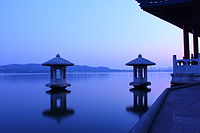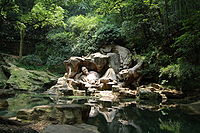
Hangzhou
Hangzhou[a] is the capital and most populous city of Zhejiang, China. It is located in the northeastern part of the province, sitting at the head of Hangzhou Bay, which separates Shanghai and Ningbo. Hangzhou grew to prominence as the southern terminus of the Grand Canal and has been one of China's most renowned and prosperous cities for much of the last millennium. It is a major economic and e-commerce hub within China, and the second biggest city in the Yangtze Delta after Shanghai. Hangzhou is classified as a sub-provincial city and forms the core of the Hangzhou metropolitan area, the fourth-largest in China after Guangzhou-Shenzhen Pearl River agglomeration, Shanghai-Suzhou-Wuxi-Changzhou conurbation and Beijing. As of 2022, the Hangzhou metropolitan area was estimated to produce a gross metropolitan product (nominal) of 4 trillion yuan (US$590 billion), making it larger than the economy of Sweden. As of the 2020 Chinese census, it had a total population of 11,936,010 inhabitants. However, its metropolitan area, populated by 13.035 million people over an area of 8,107.9 km2 (3,130.5 sq mi), consists of all urban districts in Hangzhou and 3 urban districts of the city of Shaoxing.[1]
Hangzhou
杭州市Hangchow, Hang Tsei, Hangchou
Li Huolin
Yao Gaoyuan
Ma Weiguang
16,821.1 km2 (6,494.7 sq mi)
8,259.9 km2 (3,189.2 sq mi)
8,107.9 km2 (3,130.5 sq mi)
11,936,010
710/km2 (1,800/sq mi)
10,711,238
1,300/km2 (3,400/sq mi)
13,035,329
1,600/km2 (4,200/sq mi)
CN¥ 175,587
US$ 27,223
CN¥ 3.970 trillion
US$ 590.339 billion
浙A
ɦaŋ-tsei (Hangzhou dialect)
Hangchow
"Hang Prefecture"
Hángzhōu
Hángzhōu
Hang2-chou1
ɦaŋ-tsei (Hangzhou dialect)
Hong4-zau1
Hâng-chiu
Qiántáng
Qiántáng
Ch'ien-t'ang
Hangzhou has been repeatedly rated as the best commercial city in mainland China by Forbes and the Chinese city with the highest growth potential by the Economist Intelligence Unit. A study conducted by PwC and China Development Research Foundation ranked Hangzhou first among "Chinese Cities of Opportunity". According to the Globalization and World Cities Research Network (GaWC), the city is classified as a Beta (global second-tier) city, together with Chongqing, Nanjing and Tianjin in China. Hangzhou is also one of the world's top 100 financial centers, according to the Global Financial Centres Index. It boasts the eighth largest GDP among cities in mainland China with a GDP of around 1.8 trillion RMB ($280 billion). Home to the headquarters of large global tech companies such as Alibaba Group, Ant Group, and NetEase, Hangzhou is known for attracting professionals and entrepreneurs who work in information technology. As of August 2023, Hangzhou has the tenth-most Fortune Global 500 headquarters of any city in the world and the fourth-most in China – after Beijing, Shanghai and Shenzhen – within its city limits.[9] According to the 2020 Hurun Global Rich List, Hangzhou ranks 11th in the world and 6th in China (after Beijing, Shanghai, Hong Kong, Shenzhen and Guangzhou) in the number of resident billionaires.
Hangzhou is a major city for scientific research in the Asia-Pacific, ranking 16th globally by scientific outputs.[10] It hosts several notable universities, including Zhejiang, Zhejiang University of Technology, Hangzhou Normal, Hangzhou Dianzi, Zhejiang A&F, Zhejiang Sci-Tech, Zhejiang Chinese Medical, Westlake, China Jiliang and Zhejiang University of Finance and Economics. Its West Lake, a UNESCO World Heritage Site west of the city, is among its best-known attractions.[11] In 2023, it became the third Chinese city to host the Asian Games, after Beijing 1990 and Guangzhou 2010. It was also the second Chinese city to host the Asian Para Games after the Guangzhou 2010. Hangzhou also hosted the 11th G20 summit in 2016.
Although Hangzhou has been through many recent urban developments, it still retains its historical and cultural heritage and natural environment. Today, tourism remains an important factor for Hangzhou's economy.[92] One of Hangzhou's most popular sights is West Lake, a UNESCO World Heritage Site. The West Lake Cultural Landscape covers an area of 3,323 ha (8,210 acres) and includes some of Hangzhou's most notable historic and scenic places. Adjacent to the lake is an area which includes historical pagodas, cultural sites, as well as the natural environment of the lake and hills, including Phoenix Mountain. There are two causeways across the lake.[92]
In March 2013 the Hangzhou Tourism Commission started an online campaign via Facebook, the 'Modern Marco Polo' campaign. Over the next year nearly 26,000 participants applied from around the globe, in the hopes of becoming Hangzhou's first foreign tourism ambassador. In a press conference in Hangzhou on 20 May 2014, Liam Bates was announced as the successful winner and won a $55,000 contract, being the first foreigner ever to be appointed by China's government in such an official role.[94]
Song Cheng, located at No. 148 Zhijiang Road, Hangzhou City, Zhejiang Province, in Hangzhou Zhijiang Tourism Resort, opened on May 18, 1996, is the first large-scale man-made theme park in Hangzhou.
Lingyin Temple was founded in the first year of Xianhe in the Eastern Jin Dynasty (AD 326). It has a history of about 1,700 years and is the earliest famous temple in Hangzhou.
The tomb of Wu Hanyue is located at the foot of Yuhuangshan Mountain in Hangzhou. The tomb is rectangular and divided into two chambers. It is 7.6 meters long, 2.87 meters wide and 3.1 meters deep. The stone doors of the front room were carved with nails and knockers, and on the doors were carved cameos of delicate statues.
Liuhe Tower, located in the Xihu District of Hangzhou, covers an area of 890 square meters, the Liuhe Tower is 59.89 meters high, the internal tower core is divided into seven floors of brick structure, the external wooden structure of the pavilion style corridor has eight sides and 13 floors.
Law[edit]
In 2019, Hangzhou established a pilot program artificial intelligence-based Internet Court to adjudicate disputes related to ecommerce and internet-related intellectual property claims.[95]: 124 Parties appear before the court via videoconference and AI evaluates the evidence presented and applies relevant legal standards.[95]: 124



